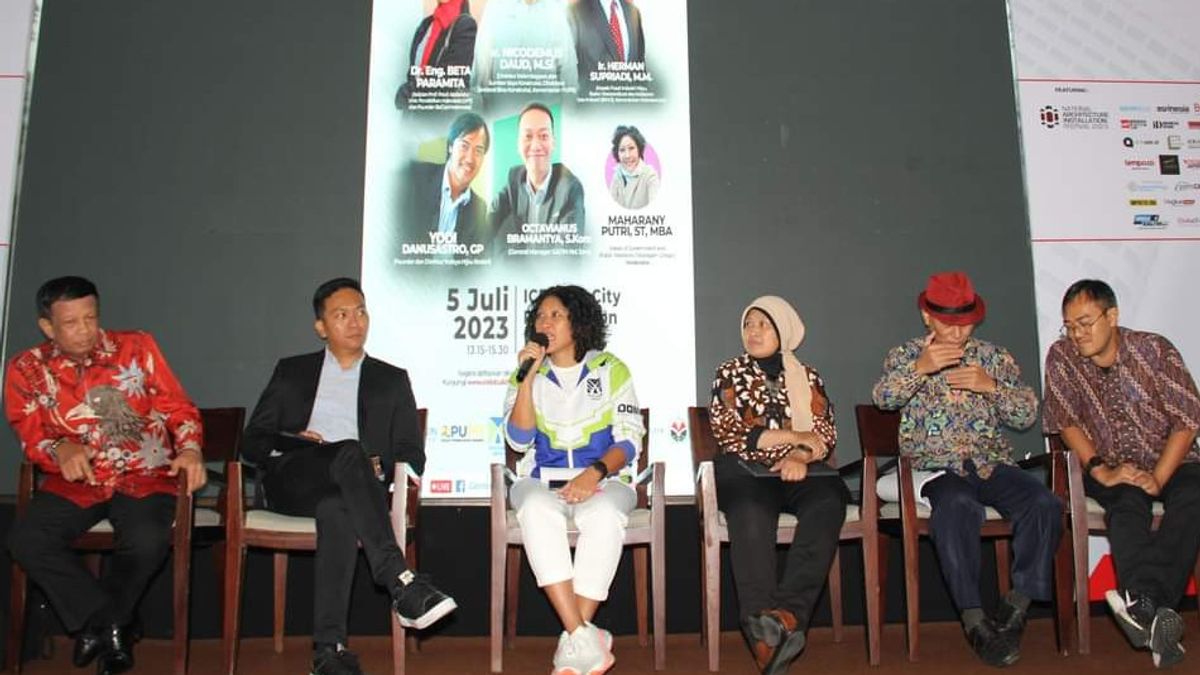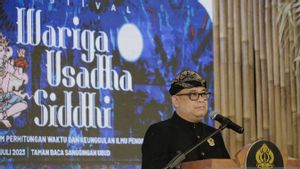JAKARTA - The increase in global temperature and climate change that has occurred due to increased carbon emissions has caused disasters throughout this hemisphere. For this reason, various global policies to control carbon emissions are encouraged to be implemented immediately around the world. In Indonesia, in 2023, the government has raised the target of the Nationally Determined Contribution (NDC) by 2030 from 29% to 31.8% to carbon neutral by 2060 or sooner. For this reason, the government needs collective action from all parties to build a empowered ecosystem.
Director of Institutional and Construction Resources, Directorate General of Construction Development of the Ministry of PUPR, Nicodemus Daud explained, in 2017 Indonesia was in the list of the top 10 most carbon-producing countries in the world. Indonesia contributes 275.4 megaton carbon dioxide (mega-ton CO2). Of these, the biggest contributors are industries, which include agriculture, livestock, and construction.
The government certainly has long-term plans to overcome this. This environmental problem is also included in the 7 national priorities of the government's 2024 work plan. One of the targets is a 27.7 percent reduction in greenhouse gas (GHG) emissions," Nicodemus explained at the Sustainable Construction seminar held by PT Tata Metal Lestari (Tatalogam Group) at the Indo BuildTech 2023 Exhibition, ICE BSD, South Tangerang.
Nicodemus explained, there are 3 impacts of climate change related to the housing and residential sectors. The first is an increase or decrease in rainfall. Then an increase in extreme weather events. And finally, an increase in sea level. This impact is then a challenge from the Ministry of PUPR in carrying out construction development in the country.
The solution to this challenge is sustainable infrastructure development. These challenges and solutions must then be implemented in the field. This is done by implementing environmental and sustainable infrastructure development in all PUPR work packages," explained Nicodemus again.
The PUPR Ministry's efforts were certainly welcomed by the Vice President of the Tatalogam Group, Stephanus Koeswandi. He said that the issue of climate change and global warming is not just a matter of the government. All elements of society must be involved in maintaining environmental sustainability, for generations to come.
"So this is not the responsibility of the government. Everything must be involved. Because as we already know that the threat of global warming and climate change is real and can be felt once in a while. For that we invite all elements of society to join together in preserving our environment," explained Stephanus.
اقرأ أيضا:
Stephanus added that collaboration between industry players and sharing information is important to map emissions released in the value chain ecosystem in order to formulate science-based measures to take decarbonization measures. Tatalogam Group together with the Center for Green Industry (PIH), the Standardization and Industrial Services Policy Agency (BSKJI), the Ministry of Industry.
Stephanus added again, another important thing to do is to innovate. He said, by continuing to innovate, the industry can support economic growth, increase competitiveness, efficiency and productivity, quality of life, and most importantly also support environmental sustainability. The steel, cement and chemicals industry is known to be the top three emissions-producing industries and is among the most difficult to decarbonize. Therefore, the use of environmentally friendly technology, to innovations needs to be done in order to reduce energy use and control emissions.
For example, to suppress energy use and reduce emissions, we PT Tata Metal Lestari innovate by producing Aluminum Seng (BLAS) Lapis steel which we name Super Nexalum and Super Nexium. Both products have up to 100 years of resilience. That way, the steel that should have been recycled in a few years was recycled by consuming a lot of energy, we could extend the life of it so that it is more durable," explained Stephanus again.
Then there is also Domus Fastrack's innovation. Light steel-based houses are made according to consumer needs, ranging from images to forming panels that are already in size. With this latest technology, no waste is produced like the general housing development process. At PT Tatalogam Lestari the same thing is also done. As the largest roof and metal tile producer in the country, PT Tatalogam Lestari has also innovated by producing final products from more environmentally friendly armored steel.
Inaccurate roof selection can have an impact on increasing temperature in a certain region. This phenomenon is called the Urban Heat Island (UHI) phenomenon. We have innovations that start from coating technology at PT Tata Metal Lestari. We collaborate with the Indonesian University of Education (UPI) Bandung through Dr. Eng Beta Paramita research, developed a cool roof technology that can reduce heat up to 6 degrees and can also reflect on the sunlight so that it does not become trapped in the city so that the Urban Heat Island Effect does not occur," explained Stephanus.
Stephanus explained, Urban Heat Island is a phenomenon of increasing the environmental temperature of an urban area that is higher than the surrounding area. This condition is caused by the large amount of solar radiation reflected and absorbed by the environment from the infrastructure fields of an area, such as road surfaces, wall surfaces, and the roof surface of a building.
For this reason, development must pay attention to its impact on the environment and building users. All elements involved in development, be it the government, entrepreneurs, and the wider community, should move together to anticipate things like this, by knowing how to choose good and environmentally friendly construction products, especially in the development of IKN later. So that with such a negative impact that arises due to infrastructure development that exacerbates the environmental and health conditions of building users, it can be prevented," Stephanus explained to reporters.
The English, Chinese, Japanese, Arabic, and French versions are automatically generated by the AI. So there may still be inaccuracies in translating, please always see Indonesian as our main language. (system supported by DigitalSiber.id)
















